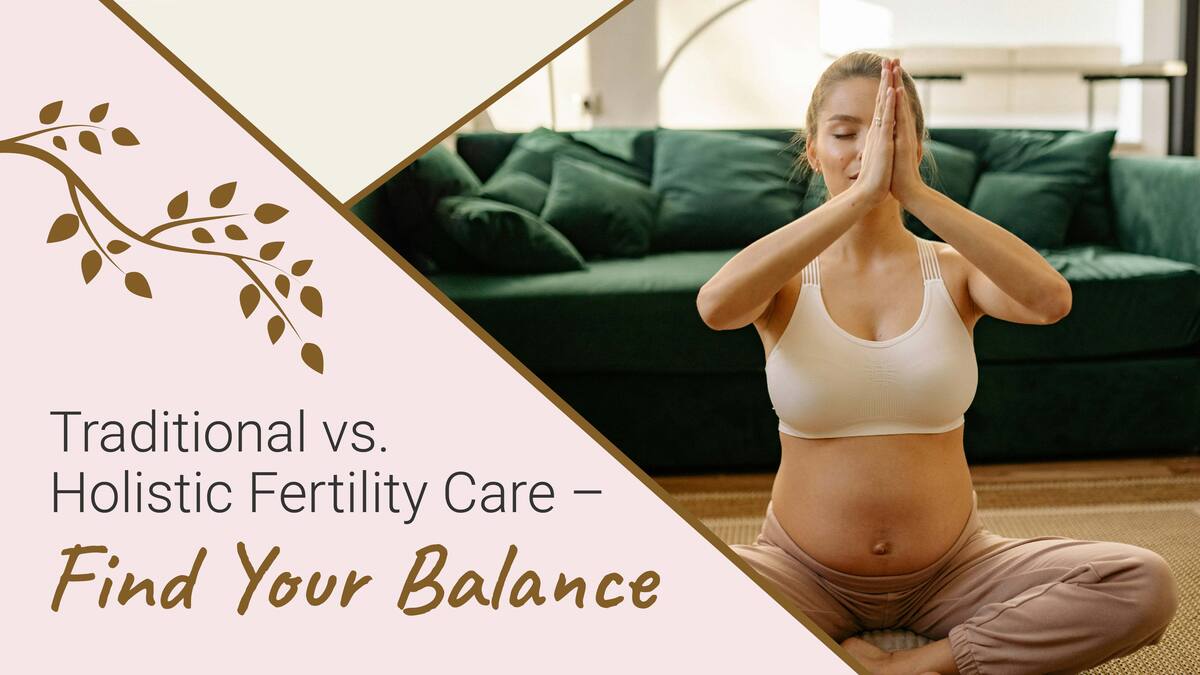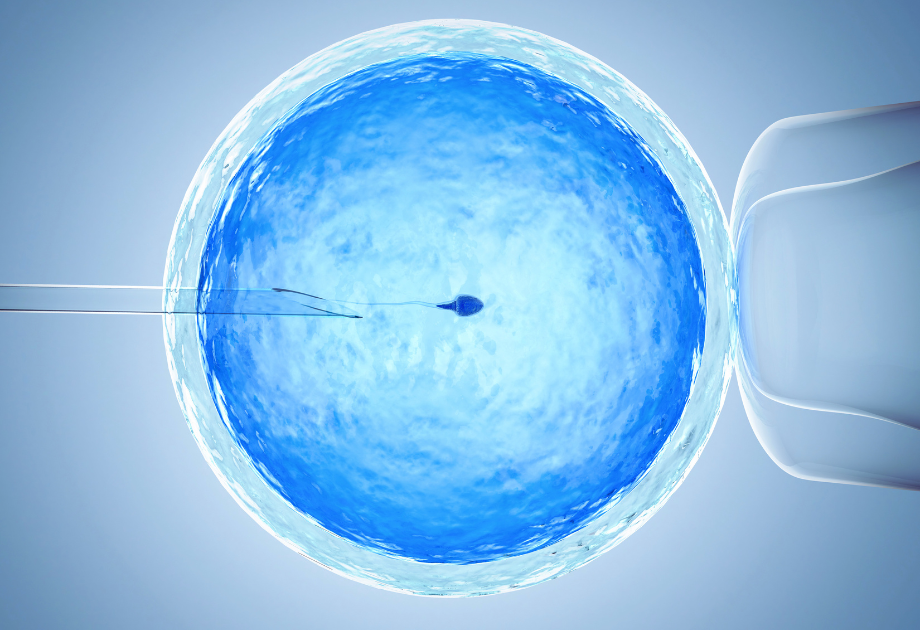Traditional vs. Holistic Fertility Care ? Find Your Balance

Fertility care isn’t one-size-fits-all. For some, medical interventions like the IUI procedure or IVF clinics offer the perfect solution. For others, integrating holistic fertility treatment—like acupuncture, nutrition, and stress management—brings a sense of balance and empowerment to their journey.
But what if you didn’t have to choose between these approaches? By combining the best of traditional and holistic methods, you can create a fertility plan that supports your body, mind, and unique goals.
This blog explores both traditional and holistic fertility treatment options to help you craft a personalized approach that balances modern, western medicine and natural wellness.

A Closer Look at Traditional Fertility Treatments
Traditional fertility treatments are rooted in modern, Western-based medicine and focus on addressing specific physiological barriers to conception. These methods rely on advanced technology and evidence-based practices, offering reliable solutions for complex fertility challenges.
What Are the Most Common Medical Options?
Medical advancements have opened doors to a variety of effective fertility treatments tailored to different needs:
- Intrauterine Insemination (IUI): Often considered a first step in medical fertility care, IUI involves placing sperm directly into the uterus during ovulation. This simple, minimally invasive procedure increases the likelihood of fertilization.
- In Vitro Fertilization (IVF): IVF is a cornerstone of traditional fertility care. Eggs and sperm are combined in a lab to create embryos, which are then implanted into the uterus. For many, IVF clinics provide a proven path to parenthood.
- INVOcell: For those seeking a more natural, cost-effective alternative to IVF, INVOcell is an innovative option. This approach uses a small device to fertilize eggs inside the body instead of a lab, offering a blend of science and simplicity.
- Intracytoplasmic Sperm Injection (ICSI): Designed for severe male-factor infertility, ICSI injects a single sperm directly into an egg to ensure fertilization.
These treatments provide clear, evidence-backed options for a range of fertility challenges, helping individuals and couples take meaningful steps toward parenthood.
Weighing the Emotional and Financial Costs of Medical Fertility Care
While traditional treatments have helped countless families grow, they can be emotionally and financially demanding. Repeated clinic visits, medications, and procedures can take a toll. However, advancements like INVOcell are making these options more accessible, giving patients new ways to pursue their dreams without feeling overwhelmed.

What Holistic Fertility Treatments Bring to the Table
Holistic fertility treatments take a whole-body approach, focusing on creating an environment where the body can thrive and support conception. Instead of addressing just one part of the equation, these treatments take an Eastern-based approach by looking at overall wellness—physical, mental, and emotional.
The Role of Acupuncture in Fertility
One of the most well-known holistic approaches, fertility acupuncture, plays a significant role in enhancing reproductive health. It works by improving blood flow to the reproductive organs, regulating hormones, and reducing stress—three vital components for conception.
Acupuncture is especially beneficial when paired with traditional treatments like IVF or IUI. It helps prepare the body for these procedures, increasing the chances of success.
How Acupuncture, Nutrition, and Stress Management Can Boost Fertility
Combining acupuncture with thoughtful nutrition and stress management techniques can create a powerful synergy for improving fertility. A balanced diet, filled with the best foods to eat while pregnant, helps regulate hormones and promote overall health, while stress-reducing practices like yoga and meditation support emotional well-being.
Managing stress during your fertility journey plays an important role in supporting both your emotional well-being and your reproductive health. Simple lifestyle changes, like incorporating regular exercise or adjusting your diet, can make a meaningful difference in preparing your body for conception.
When Holistic Approaches May Fall Short and What to Watch For
While holistic treatments are an excellent way to support your journey, they may not directly address medical conditions that prevent conception. For example, acupuncture and dietary changes won’t resolve blocked fallopian tubes or severe male-factor infertility. However, when paired with traditional care, holistic methods can provide the balance and support needed to navigate these challenges more effectively.
Finding the Balance Between Traditional and Holistic Approaches
The beauty of fertility care today is that you don’t have to choose one approach over the other. Combining the precision of medical treatments with the nurturing support of holistic methods offers a well-rounded path to parenthood.
Matching Each Approach to Different Needs and Goals
Your fertility plan should reflect your unique circumstances, goals, and preferences. Traditional methods like IVF or ICSI are ideal for addressing specific physical challenges, while holistic treatments support your overall well-being. For example, adding fertility acupuncture or dietary adjustments to an IVF cycle can improve outcomes and make the process feel less stressful.
Start by evaluating your goals. Do you need immediate results, or are you looking to improve your overall health before pursuing medical interventions? Discuss these priorities with your healthcare team to create a plan that works for you.
Differences in Results, Costs, and Lifestyle Changes
Traditional treatments often provide faster, measurable results but can involve higher costs and significant lifestyle adjustments, like frequent clinic visits or recovery periods. Holistic methods are generally more affordable and accessible, but they require consistency and patience to see results.
By combining these approaches, you can address both immediate needs and long-term goals, creating a comprehensive plan that feels manageable and aligned with your life.

Questions to Ask When Building Your Fertility Plan
Choosing the right fertility plan is a deeply personal decision. Here are some questions to guide your process and ensure you’re on the right track:
- What are my fertility goals? Are you looking for a solution to a specific challenge, or are you focused on optimizing overall health? Defining your goals will help you and your provider choose the right mix of traditional and holistic treatments.
- What’s my timeline? If you’re working within a shorter timeframe, traditional treatments like IVF or IUI may take priority. For those with more flexibility, incorporating holistic methods like fertility acupuncture or lifestyle adjustments can create a strong foundation for success.
- How does stress affect my journey? Fertility challenges can be stressful, and managing stress during your fertility journey is essential. Explore options like yoga, meditation, or acupuncture to help maintain emotional balance.
- What’s my budget? Understanding the financial implications of treatments is critical. Traditional methods can be costly, while holistic approaches tend to be more budget-friendly. Finding the right balance can help you plan sustainably.
Answering these questions helps you create a plan tailored to your unique needs, aligning with both your body and your lifestyle. Open communication with your provider is key to making informed, confident decisions.
Taking the Next Step with The Fertility Wellness Institute of Ohio
At The Fertility Wellness Institute of Ohio, we’re here to help you find your balance. Whether you’re exploring holistic fertility treatment, considering medical interventions like IVF, or learning how to manage stress while pregnant, our team provides personalized, compassionate care every step of the way.
Ready to take the next step? Contact us today to schedule your consultation and discover how we can support you on your journey.

